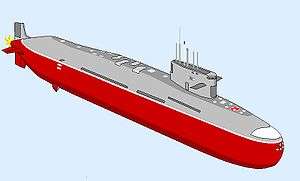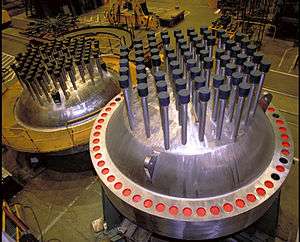Sekhar Basu
| Sekhar Basu | |
|---|---|
| Born |
September 20, 1952 Kolkata, West Bengal, India |
| Occupation | Nuclear Reactor Engineer |
| Awards |
Padma Shri INAE Fellow Indian Society for Non Destructive Testing Fellow DAE Group Achievement Award Indian Nuclear Society Award DAE Special Achievement Award |
Sekhar Basu is an Indian nuclear scientist[1][2][3] and regarded by many as the architect of the land based Nuclear Submarine Propulsion Plant at Kalpakkam[4] and the 80 mega watt compact pressurised water reactor (PWR),[5] commissioned to power the Arihant-class submarine for the Indian Navy.[6][7][8] The Government of India honoured him, in 2014, by awarding him the Padma Shri, the fourth highest civilian award, for his contributions to the fields of science and technology.[9]
Biography

Sekhar Basu was born on 20 September 1952[1] in Kolkata, West Bengal, India and completed his schooling at the Government High School, Ballygunje, Kolkata district.[2][3] His graduate studies was in mechanical engineering at the Veermata Jijabai Technological Institute (VJTI), University of Mumbai[5][6][8][10] which he completed in 1974 to join Bhabha Atomic Research Centre training school[11] and did a one-year training programme in nuclear science and engineering.[1][2][3][8]
Basu started his career by joining BARC in their Reactor Engineering Division in 1975 where his initial assignments were in designing fuel for boiling water reactors.[1][2][3] In 1988, Basu was transferred to Kalpakkam as the project Director with the responsibility to build India's first compact Pressurised Water Reactor powered by enriched uranium,[10] which he is reported to have accomplished in 2006.[6] He continued his work there to commission India's first shore based nuclear submarine propulsion plant.[8] In 2000, he became the Chief Executive Officer of the Nuclear Recycle Board and is reported to have played a vital role in the establishment of nuclear recycle plants in Kalpakkam, Tarapur and Trombay.[1][2][3][6] He is also credited with the establishment of the India-based Neutrino Observatory in Theni, Tamil Nadu.[1][2][3]
In June 2012, Basu was made the Director of the Bhabha Atomic Research Centre.[1][2][3][6][8][10]
Legacy

One of the first achievements of Sekhar Basu was his contribution in the development of fuel for boiling water reactors, a feat he achieved while working in the Reactor Engineering Division of the Bhabha Atomic Research Centre.[6] When Basu was transferred to Kalpakkam, in 1988, as the Director of the BARC facilities there,[8] one of his primary assignments was to oversee the commissioning of India's first pressurized water reactor, in the capacity of the Project Director of the Plutonium Recycling Project (PRP).[10] Six years later, Basu and his team commissioned the shore based reactor[7][8] which commenced operations on 22 September 2006.[6] The achievement had far reaching impact as this reactor was the prototype for the one that powered Arihant-class submarine,[5][6] the first indigenously designed and built Indian submarine.[12] In July 2009.[13] The lead vessel in this class, INS Arihant was launched, the vessel beginning sea trials in 2014.[14]
It was under the leadership of Sekhar Basu that the Nuclear Recycle Board,[5] designed, developed and built the reprocessing and waste management plans at Trombay, Tarapur and Kalpakkam.[6][15] He is also credited with the development of the first Integrated Nuclear Recycle Plant in India.[15] His current activities center around the major expansion prgrammes of BARC in the food and health sectors,[11] particularly in the areas of nuclear agriculture, food preservation and nuclear medicine.[2][3] He is also overseeing the development of the 1 Gev Superconducting Accelerator and the setting up of a nuclear fuel cycle park with fuel fabrication and reprocessing facilities in Visakhapatnam.[2][3] His contributions are reported for the setting up of the Fusion Reactor Programme (International Thermonuclear Experimental Reactor)in France.[11]
Sekhar Basu is also credited with several articles, published in national and international journals.[1][2][3][11]
Positions
Sekhar Basu has held many important positions in the nuclear energy field in India such as:
- Director - Bhabha Atomic Research Centre[1][2][3][4][10]
- Project Director - Nuclear Submarine Programme (BARC)[1][2][3]
- Chief Executive - Nuclear Recycle Board (BARC)[2][3][4][10]
- Board Member - Nuclear Power Corporation of India[1][4]
- Chairman - Project management Board - India-based Neutrino Observatory[1]
- Director - Bharatiya Nabhikiya Vidyut Nigam[4][16]
Basu has represented India at various international agreements such as Arrangements and Procedures agreement with the US Government for reprocessing of US hypothecated fuel.[1][2][3][4] He was a member of the Indian delegation to the Spent Fuel Management Conference[17] organized in Vienna by the International Atomic Energy Agency.[4] He has also held the Chairmanship of the international committee of the International Thermonuclear Experimental Reactor programme (ITER).[1][2][3]
Awards and recognitions
Sekhar Basu has been honoured by way of fellowships by many academic institutions such as the Indian National Academy of Engineering (INAE)[4] and the Indian Society for Non Destructive Testing (ISNT).[1][2][3][18] Jadavpur University, Kolkata conferred DLitt (Honoris Causa) on him in 2013,[1][2][3] the next year, the Government of India awarded him the civilian honour of Padma Shri.[1][9] He is also a recipient of DAE Group Achievement Award (2006),[4] Indian Nuclear Society Award (2002)[4] and the DAE Special Achievement Award (2007).[1][2][3][4]
See also
References
- 1 2 3 4 5 6 7 8 9 10 11 12 13 14 15 16 17 18 "NPCIL". NPCIL. 2014. Retrieved October 30, 2014.
- 1 2 3 4 5 6 7 8 9 10 11 12 13 14 15 16 17 18 "BARC" (PDF). BARC. 2014. Retrieved October 29, 2014.
- 1 2 3 4 5 6 7 8 9 10 11 12 13 14 15 16 17 18 "Barc Profile". BARC. 2014. Retrieved October 29, 2014.
- 1 2 3 4 5 6 7 8 9 10 11 "Business Week". Business Week. 2014. Retrieved October 29, 2014.
- 1 2 3 4 "Outlook India". Outlook India. 31 March 2014. Retrieved October 29, 2014.
- 1 2 3 4 5 6 7 8 9 "The Hindu". The Hindu. June 20, 2012. Retrieved October 29, 2014.
- 1 2 "TOI". TOI. 31 March 2014. Retrieved October 29, 2014.
- 1 2 3 4 5 6 7 "Indian Express". Indian Express. 20 June 2012. Retrieved October 29, 2014.
- 1 2 "Padma 2014". Press Information Bureau, Government of India. 25 January 2014. Retrieved October 28, 2014.
- 1 2 3 4 5 6 "Jagaran Josh". Jagaran Josh. 21 June 2012. Retrieved October 29, 2014.
- 1 2 3 4 "Bhavini profile". Bhavini. 2014. Retrieved October 30, 2014.
- ↑ "BBC Arihant". BBC. 10 August 2013. Retrieved October 30, 2014.
- ↑ "TOI Arihant". TOI. 21 January 2014. Retrieved October 30, 2014.
- 1 2 "Waste management". The Hindu. October 29, 2012. Retrieved October 30, 2014.
- ↑ "Bhavini". Bhavini. 2014. Retrieved October 30, 2014.
- ↑ "IAEA". IAEA. 2014. Retrieved October 30, 2014.
- ↑ "ISNT". ISNT. 2014. Retrieved October 29, 2014.